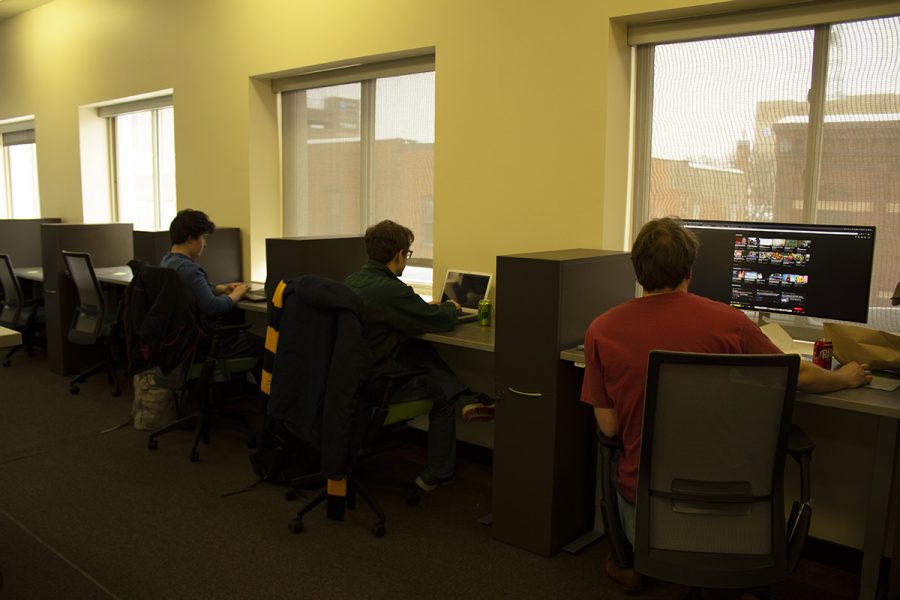Student-run software company provides high-impact experience for students
Clearwater Labs uses industry technology to prepare software engineering students
More stories from Rachyl Houterman
Photo by Rachel Houterman
Clearwater Labs employees, including Alex Stout, co-founder and director and technical manager (far right), work in their new downtown office space at CoLAB, which is across from the Micon Downtown Cinema.
A new on-campus, student-run software company is providing software engineering students with real-world experience using leading industry technology to better prepare them for their first jobs after graduation.
Founded in fall 2018, Clearwater Labs comprises seven student employees, led by co-founders Alex Stout and Grey Larson. With an overarching vision to benefit all UW-Eau Claire students, Stout said the idea to create Clearwater Labs came to him last March.
“I was kind of thinking there’s not really a good avenue for software engineer students on campus to really get the kind of experience that’s out at the internship level,” Stout said. “We learn a lot of the basics of computer science, but there’s not a lot of engineering until your last year, and at that point if you don’t go and learn it on your own, you’re kind of behind the curve I’d say.”
As part of its mission, Larson said the organization provides its employees opportunities to take risks, be innovative and take ownership of projects. This gives Clearwater Labs’ software engineers a leg up in their field and eases the likelihood of “impostor syndrome” at their first jobs.
Impostor syndrome denotes a psychological phenomenon where an individual doubts his or her abilities and feels like a “fraud” in his or her field.
“I think Clearwater is a really good bridge between learning the theory in class and learning basic building blocks of developing software and between a job in the corporate environment,” said Tyler Reski, a junior software engineer. “Honestly, if I didn’t have this position, I don’t think I’d feel very successful in a corporate position; going straight from classes, to having a corporate job after college.”
The group collaborates on developing products aimed at improving the lives of fellow students. One example is the parking notifier, a messaging service that texts registrants when alternate side parking is in effect.
Their next project involves a partnership with the Student Office of Sustainability to create an energy dashboard.
Clearwater Labs will take energy usage data from the university and make it into an accessible format for students to view. They also have professors who want to use the data in classrooms and for assignments as stakeholders in the project.
Having specific insight into a problem makes it easier for a business to provide a solution, Larson said. Therefore, developing products for students seemed fit, considering Clearwater Labs’ “unique” position.
“When we first established and we were looking for projects to work on, one of our first ideas was to focus on student life problems because that’s really one thing that makes us unique as a group,” Larson said. “There are lots of software startups out there, lots of groups of developers working on interesting projects, but one of the really unique things about us is we’re all students and we’re all still on campus.”
Though it won’t likely be in their near future, Stout said another project he’d like to do is create a blockchain certification system for diplomas.
“The idea is that you get your diploma on the blockchain,” Stout said. “Every time you go to apply to a job, you have to send your transcript and diploma, and it costs … $15 or $16 per job to send it to. If there’s a blockchain solution that you can go online and give them this link or this string, the employer can go on UWEC’s website and get your transcript download. Then that would save you a bunch of money, save the employer time from mailing and everything.”
Diplomas can also be easily forged, but a blockchain solution would resolve this.
Information is stored across a large network of computers where a swath of users verify the transactions of other users, making manipulation of information in the blockchain extremely difficult. A few other universities in the nation are using blockchain for student records, such as MIT and East Coast Polytechnic Institute University.
Looking toward the future, Stout and Larson said Clearwater Labs will be seeking partnerships with regional corporate companies, following what’s known as the Research Park model.
A research park model outlines a plan for corporate-student engagement. Through these partnerships, Clearwater Labs software engineers would work on innovative projects supplied by the various companies.
The grand vision, Larson said, is to eventually establish an interdisciplinary “research park,” where all students at UW-Eau Claire could benefit from the corporate-university partnerships.
Ultimately, Clearwater Labs wants to create a better experience for students of all disciplines on campus, not just software engineering students.
“I think increasingly in the world today, especially larger companies are realizing, to solve a lot of technical problems, it takes people who have more kind of soft skills,” Larson said. “Getting university-wide, including a lot more students from a lot more backgrounds, and chasing down corporate partnerships is really where we’re headed.”
This more inclusive model would bring public relations, social sciences and other disciplines to the table, Larson said. One example, Stout said, is medical humanities, where he believes there is room for social science students to influence medical technology to better the lives of doctors.
“So that’s kind of an example of a confluence we see of different disciplines, but it can really go in any direction,” Stout said, “and I think that’s what makes Eau Claire strong is the partnerships and the collaboration that happens between differently minded people.”
Houterman can be reached at houterrl9470@uwec.edu.


